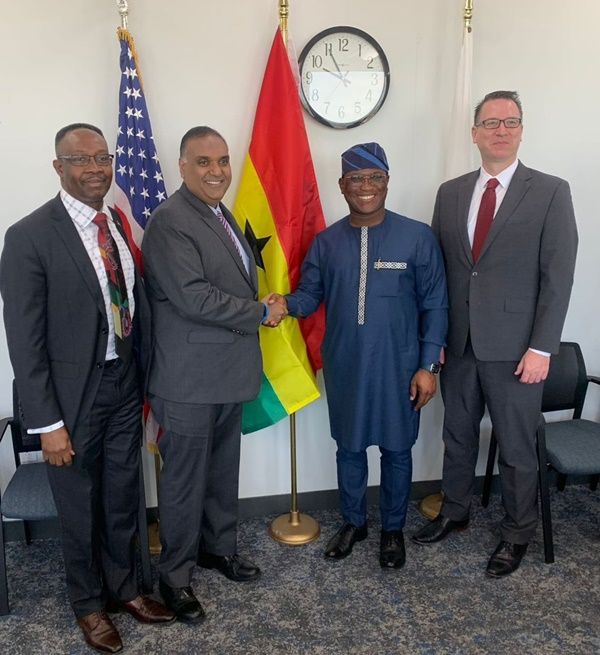
Matthew Hatfield, Director of Airline Route Development at Logan International Airport, has announced that prospective airlines that will open direct flights on new routes Boston-Accra, Accra-Boston, and Boston-Kumasi Prempeh I International Airport, would benefit from a one-year free landing package provided by the State of Massachusetts.
These incentives, according to him, are mainly meant for airlines willing to fly and operate these new routes.
“For Airlines coming on board to fly these new routes, there will be no charge for landing for the first year but 50% payment of landing fee in the second year.
Such prospective airlines will also be compensated and paid US$300,000 for their marketing purposes,” Matthew Hatfield explained.
This came to light during a recent strategic business meeting in Massachusetts between a Ghanaian delegation led by Ghana’s Deputy Minister of Transport, Hon. Hassan Tampuli, Massport and aviation authorities in Massachusetts.
The meeting also had in attendance Hon. Ken Asafo-Adjei himself, as well as Jeevan Ramapriya, the Executive Director of Massachusetts Port Authority.
Ghana is actively lobbying and advocating for the establishment of new aviation routes connecting Boston to Accra, Accra to Boston, and Kumasi International Airport respectively.
The plans aim to attract airlines to operate these new routes.
By introducing these routes, Ghana seeks to provide more convenient travel options for passengers and boost tourism and business exchanges.
This push aims to enhance travel and economic ties between Ghana and the United States.
The proposed routes reflect Ghana’s commitment to expanding its aviation network and strengthening international connectivity.
The move, which is being facilitated by Ghana’s Ministry of Transport, The New England Ghanaian community led by Hon Ken Asafo-Adjei in partnership with the Massachusetts Port Authority.
It is meant to save Ghanaians and African travellers the trouble to always transit to JFK Airport before making their way to Ghana.
It is anticipated that citizens of these countries would love to patronize a direct flight from Boston to Accra and Accra to Boston rather than spend 6hrs+ of productive time waiting at the airport.
It is also meant among other things to provide timely convenience in accessing direct flights from Massachusetts to Ghana.
Addressing the meeting, Hon. Hassan Tampuli was positively confident about the future based on the outcome of this successful business meeting.
“Today’s meeting is more about facilitating the commencement of Aviation Services between Ghana Accra, Kumasi and Boston in the state of Massachusetts.
….The meeting went very well with so much outlined and we are very happy about the positive outcomes in the coming months.
It will take more or less economic determination to make this happen so we leave it in the hands of our US partners.
In terms of policy, legal framework, diplomacy or arrangements, we as a government stand in readiness to support this vision to make it happen,” Hon. Hassan Tampuli reiterated.
Hon. Ken Asafo-Adjei, on his part, said the New England region hosts over 68,000 Ghanaians and there is always a big problem for citizens flying to Ghana.
“These discussions we had today come after a successful bilateral business dialogue last year in terms of exploring business and aviation prospects between Ghana and the US.
It is very hectic and disturbing going to Ghana especially from New England.
We always have to go through JFK (New York) Or Ronald Reagan (Washington)
On the average, you have to spend about 7 to 8 hours before getting a flight to Ghana. So it is on that score that we realised we have huge numbers from this side of USA because according to the Massport data about 30 people travel in a day from Boston to Ghana, you can imagine within a period of 30 days.
We have made a business case that is deserving of these new aviation routes Boston-Accra, Accra-Boston and Kumasi due to our growing huge numbers.
Just as we also joined United, New York, Delta and Washington, we are expecting more and more Ghanaians from other states if these new routes come into operation.
This business case and reason also offers a safety net for airlines because there will be no losses at all.
This is apparently due to the highly anticipated significant boom in travel patronage,” Hon. Ken Asafo-Adjei stated.
Jeevan Ramapriya, Executive Director of Massachusetts Port Authority also shared this information with the media.
“Before the COVID-19 Pandemic, we were approached to review the traffic situation between Boston and Ghana.
When I met with my counterparts at the Accra Airport during the conference, their understanding was similar to mine where the suggestion was that to pursue such service, it would be best we had the Ghana Airlines revived and come back into the fold where it would be a benefit for them to come to Boston even if it is three times a week I think it would be sufficient for that.
….So, the whole year of 2023, we had just over 20,000 passengers travelling between the two cities which is typically less than what we would like to see before we pursue anything.
The magic numbers ride around 30,000 passengers a year depending on the type of market that it is. We acknowledge that there is a large community here in Boston but it boils down to just 27 passengers a day leaving Boston, which is why the airlines are satisfied with flying those passengers to a different city.
So you know there are flights out of New York JFK and Washington on United and Delta but as of today we are positioned where we have to play second to New York unfortunately.”
Here are some other benefits that this direct flight initiative is seeking to offer:
Time Efficiency: Reduce travel time by eliminating layovers and connecting flights.
b. Convenience: Uninterrupted journey eliminating the hassle of changing planes or dealing with layover delays.
c. Boosting Tourism: This makes Ghana and the New England Region more accessible to tourists, potentially increasing airline revenues and tourism
revenue.
d. Strengthening Trade Relations: Direct flights facilitate easy movement of goods and people, fostering stronger trade relations.
e. Cultural Exchange: Encourage cultural exchange by facilitating easy travel. This can lead to increased understanding, collaboration, and appreciation of
cultures.
f. Business Opportunities: Improved accessibility can attract businesses to expand or establish operations
in Ghana, fostering economic growth and creating job opportunities in both regions.
g. Educational and Research Collaboration: Enhance collaboration between educational and research institutions in the New England Region, promoting
knowledge exchange and academic partnerships.
h. Diaspora Connection: This makes it easier for citizens listed above, living in the New England Region to visit their home country, fostering stronger connections with family and culture.
i. Healthcare Access: Facilitate easy access to medical
treatments, expertise, and healthcare resources.
j. Environmental Impact: Direct flights often have a lower environmental impact compared to connecting flights, as they require less fuel and produce fewer emissions per passenger-mile traveled, contributing to sustainability efforts in the aviation industry.
Source: peacefmonline.com


